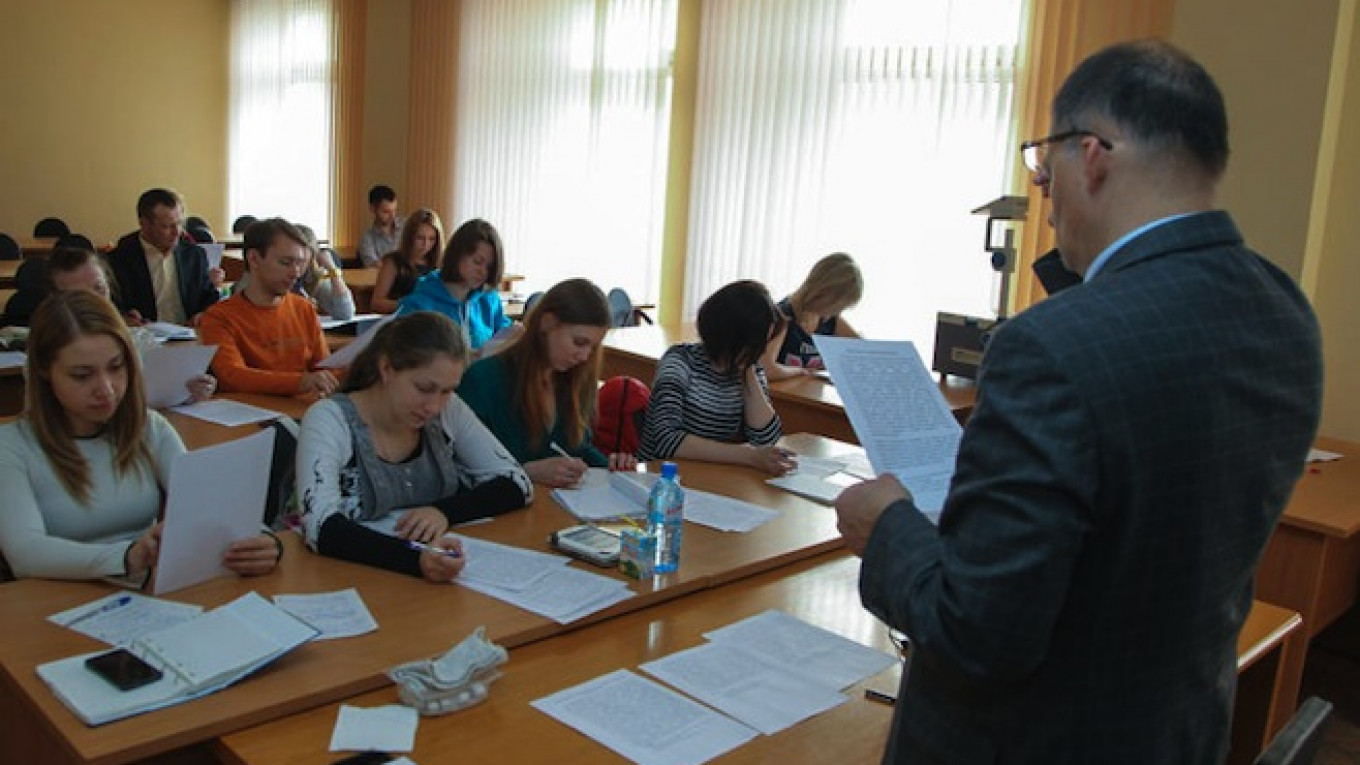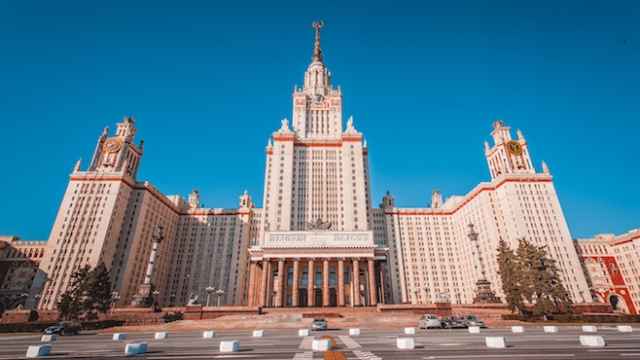A report this week of research papers and scientific articles becoming subject to vetting by the Federal Security Service (FSB) before publication rattled Russian academics, coming on the heels of several cases in which people have been accused of espionage and treason in connection with their professional activities.
The report published Tuesday by Nature, a respected international scientific journal, said that a biology institute at Russia’s biggest university — the prestigious Lomonosov Moscow State University (MSU) — had instructed its scientists to get all research manuscripts approved by the FSB before submitting them to conferences or journals.
Though the report cited a transcript of a recent meeting during which the instructions were given to professors, MSU officials denied Wednesday that FSB vetting was practiced in the university.
The denials did not convince everyone, with some academics expressing fear that the Soviet censorship system was creeping its way back into Russian science.
“Our generation remembers it too well from Soviet times, when everything went through the KGB,” Vyacheslav Shuper, a professor at MSU's geography faculty that he said received similar instructions about two weeks ago, told The Moscow Times by phone Wednesday.
In the most recent case of a Russian academic or expert being accused of treason over their work, Vladimir Golubev, a scientist from the Russian Federal Nuclear Center, was arrested in February for publishing a paper about explosives after speaking on the same topic at a conference in Prague.
He was accused of treason and disclosing state secrets by the FSB, but both he and his lawyer insisted that all the information in the paper had been published numerous times before in scientific journals, and therefore couldn't be considered secret. Golubev was amnestied in May.
Official Denial
When the First Department Doesn't Help
In 2010, two St. Petersburg scientists — Svyatoslav Bobyshev and Yevgeny Afanasyev, both aged 57 at the time — were arrested on espionage charges.
They worked at the Baltic State Technical University and specialized in gas dynamics, the study of the motion of gases and its effects. They were accused of passing sensitive information that could damage Russia's national security to unidentified Chinese nationals.
Baltic State Technical University had a cooperation agreement with China's Harbin Engineering University, which Bobyshev and Afanasyev had visited at least six times to give lectures together.
Like every Russian university — in theory, at least — the Baltic University had staff who scrutinized articles written by professors and the texts of their lectures for foreign conferences before they were published or presented in public.
The university's former rector, Yury Savelyev, expressed doubt about the treason charges in an interview with Ogonyok newspaper at the time, saying that lectures undergo triple checks: first by the department chairman, then by the university's security department, and finally by a special commission on export controls.
"Moreover, every professor goes through a special instructions procedure before going abroad," Savelyev was cited as saying.
Yury Kruglov, the department chairman, told Ogonyok that the professors' research did not involve any information that justified their arrest.
Nevertheless, in 2012 the scientists were convicted to 12 years and 12 1/2 years, respectively, in maximum security prisons.
Afanasyev died of a heart attack in prison in April this year.
According to the transcript of a meeting held on Oct. 5 at MSU's Belozersky Institute of Physicochemical Biology and cited by Nature, scientists should seek permission to publish their work from the university’s First Department — an entity that exists at all Russian universities and research institutes and that is closely associated with the FSB.
They were told to get approval “despite the obvious absurdity of the whole situation,” the report said.
Andrei Fedyanin, a pro-rector at MSU, confirmed Wednesday that the meeting had taken place, but said no FSB vetting was discussed.
“The meeting … was devoted to questions regarding improving the standard of the publications, their quality and citation rate,” he told the Interfax news agency.
“Among other things, [scientists] were reminded about the regular protocol that has existed for decades at Moscow State University: Expert commissions [consisting of] our employees examine research papers to assess their scientific novelty and possibility of publication,” Fedyanin said.
Neither the FSB nor the Education and Science Ministry responded to requests for comment sent by The Moscow Times on Wednesday.
Secret Instructions
Shuper from the geography faculty said that the department he works for held a meeting about two weeks ago where similar instructions were announced by the senior departmental staff.
“We were told that examination reports had been reinstated. They showed us the format for such reports and named the people on the expert commissions,” he told The Moscow Times in a phone interview.
The expert commissions that examine research papers prior to their submission for publication or presentation at conferences consist of fellow scientists, said Shuper, but they are supposed to examine the manuscripts for certain elements described in secret documents.
“[They are] so secret that they can't disclose them or take them out of their office,” he said. “Where do you think they get these instructions from? Who coordinates their work, who creates these standards?” the professor added.
A similar procedure existed during Soviet times, he said: Scientific works were inspected for content that could endanger the country's security. The practice was never repealed, people simply started ignoring it when the Soviet Union collapsed, he added.
More Than Paperwork
At MSU, the practice has been reinstated selectively, according to Shuper: For example, there is no such requirement in the mechanics and mathematics faculty, or at MSU's Institute of Geography, a research center where Shuper also works that is separate from the geography faculty.
“But mechanics and mathematics are also important in terms of the country's security and defense potential — no less than geography,” he said. “And if geography is so important, why is the Institute of Geography excepted [from the procedure]?” Shuper added.
MSU is not the only center of higher education dealing with the examination reports. Shuper said he had received a letter from the Urals, from a person who asked for their name and the name of their institution to be withheld, fearing retribution.
“At his university, scientists were forced to translate manuscripts written in English back into Russian for examining. But the experts are their fellow professors, and they know English very well,” so the Russian version was likely prepared for someone else, Shuper suggested.
According to him, the consequences of this practice could be grave.
“It is a way of blocking whatever information you don't want to get out from doing so,” said Shuper.
People who remember Soviet times weren't enthusiastic about bringing back examination reports, he added, but the younger scientists weren't too afraid of it, considering it was just additional paperwork.
“In the beginning it will be just additional paperwork, but it's much more than that,” Shuper told The Moscow Times.
FSB or Accounts?
Gennady Sardanashvili, a professor at the physics faculty of MSU, told The Moscow Times he hadn't heard anything about mandatory examination reports, either from his colleagues or the university administration.
“No one has talked about it to me personally. I've never heard about it from my colleagues or friends, or from the administration — just from that article [in Nature],” he told The Moscow Times on Wednesday.
Yevgeny Taranov, a Ph.D. student and researcher at the Vinogradsky Institute of Microbiology at the Russian Academy of Sciences, said his institute has always had a First Department, but it was unclear whether it was connected to the FSB.
“All I heard was our lab head saying that soon we would have to return to approving manuscripts before sending them off to international science journals, but that's it,” he told The Moscow Times in written comments.
Oleg Gusev, a professor at Kazan Federal University (KFU) in Russia's republic of Tatarstan, told The Moscow Times that KFU scientists have to get approval for their manuscripts, but he didn't know the details of the procedure, and said it could be easily ignored.
Gusev echoed Taranov's doubts about the First Department being controlled by the FSB. “It might be some poor girl from the accounts department who checks the papers for information that could formally be considered secret, in order to save us from the FSB,” by stopping scholars from unintentionally disclosing classified information, he said.
Contact the author at [email protected]
A Message from The Moscow Times:
Dear readers,
We are facing unprecedented challenges. Russia's Prosecutor General's Office has designated The Moscow Times as an "undesirable" organization, criminalizing our work and putting our staff at risk of prosecution. This follows our earlier unjust labeling as a "foreign agent."
These actions are direct attempts to silence independent journalism in Russia. The authorities claim our work "discredits the decisions of the Russian leadership." We see things differently: we strive to provide accurate, unbiased reporting on Russia.
We, the journalists of The Moscow Times, refuse to be silenced. But to continue our work, we need your help.
Your support, no matter how small, makes a world of difference. If you can, please support us monthly starting from just $2. It's quick to set up, and every contribution makes a significant impact.
By supporting The Moscow Times, you're defending open, independent journalism in the face of repression. Thank you for standing with us.
Remind me later.






